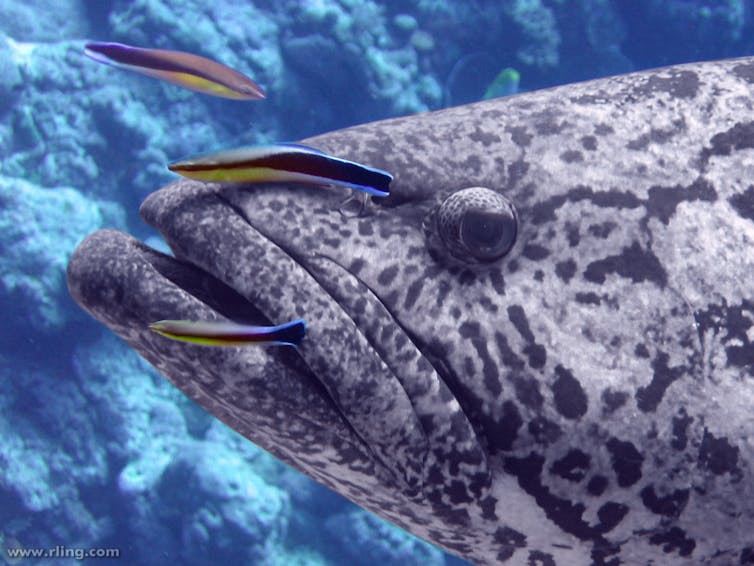How Do The Animals Feel About Trading With A Human
From Brexit to Donald Trump'due south offset acts every bit Usa president, the news has been full of discussion about trade agreements recently. But merchandise agreements aren't only relevant to human being politics. Exchange of commodities happens in the animal world too, both within and between species. And by applying theories derived from man economics, we can empathise why some animals behave as they practice.
One case of trade between animals is the way some females substitution sex for a squeamish present. Amidst the Pisaura mirabilis spiders, females are much more probable to requite in to a suitor if he brings her a nuptial souvenir: a tasty insect casualty wrapped in spider silk. While the female is preoccupied unwrapping and eating the gift, the male person can start mating with her. In the spider world it'south normally a good thought for males to mate with females that are decorated doing something else, like feeding, to avoid the female just eating him instead.
Merely it'south cheaper for him to just bring her a fake souvenir: a piece of something inedible, such as a institute seed, also wrapped in silk. The nice wrapping often still convinces her to copulate. Just she gives him a worse deal. As she spends less time preoccupied with the gift, he has much less time to insert his sexual activity organs. The message to the males is clear: if you bring a more expensive present, you'll exist paid with better sex.
Animal trade goes beyond mating pairs, nonetheless. Some biological systems can exist understood every bit a marketplace where the concepts of supply and demand from economical theory govern the prices paid for traded bolt. This is the instance at cleaning stations in the Great Barrier Reef, where cleaner fish, Labroides dimidiatus, provide their client fish with a parasite-removal service in return for the food reward that are the parasites.

Cleaner fish quickly acquire to treat their more choosy customers to a better service. Some clients take small territories and therefore access to only one station, while others motility well-nigh more and have more options available. This means they can afford to shop around for the best bargain and be choosy. Cleaners are sure to nourish to these choosy clients first, happily making other clients wait around, as they acquire that clients volition accept the bad deal of waiting when having nowhere else to go to get de-bewitched.
It also turns out that creature societies where individuals breed cooperatively can exist viewed every bit biological market places. Many mammals are cooperative breeders, including meerkats and mongooses, as are some birds, fish and insects. Their social groups consist of a single breeding pair, or a single breeding dominant female person, and a number of subordinate helpers.
Subordinates care for the offspring of the dominants, bring food and help defend against predators, all while agreeing to not brood themselves. Interestingly, subordinate helpers in these kinds of societies are all perfectly capable of reproducing, just they choose non to.
Division of labour
1 of the bang-up questions in behavioural environmental is this: why exercise these helpers stay in the grouping and assist someone else to reproduce? Afterward all, development favours selfish strategies of passing on one's own genetic textile. Biological market theory proposes that subordinates trade their services for the benefits of group membership. The amount of help they provide should and so be affected past the supply and demand for aid in the population.
Paper wasps, Polistes dominula, also alive as cooperative breeders. In return for the hard work of building the nest and collecting nutrient for the precious larvae babies of the dominant wasp, a subordinate receives the small chance of somewhen becoming the dominant herself or maybe sneaking in a few of her ain eggs among the colony's brood. To show that this substitution of behaviours is a biological market place, we need to bear witness that changes in the supply and demand of helping behaviour affects the price subordinates pay for grouping membership.
In a new large field study in southern Spain, my colleagues and I tracked thousands of wasps from hundreds of nests over three months. We increased the supply of exterior options available to subordinate wasps by freeing up suitable nesting spots and releasing extra potential nesting partners.
Subordinates now had more than options available for leaving their current group and starting up new groups with others, assuasive them to be more than choosy as to which group to belong to. Nosotros found that changing the state of the market in this way clearly affected cooperative behaviour within groups: the subordinates foraged less for their group. Competition for aid in the population had probable intensified, so the dominant breeders had to accept a worse deal to retain their subordinate trading partners.
Market theory is far from the only concept from economic science that offer valuable insights into biological systems. In fact, Charles Darwin himself found inspiration in economics when formulating his theory of development. Merely if biologists can larn from the emerging backdrop of human markets, perhaps humans can also learn from the biological systems. For example, if nosotros cut the ties to major trading partners, will this narrow downwardly our options for trade? If and then, we will end up having to take worse deals. Which would be a pertinent lesson for today's politicians.
Source: https://theconversation.com/what-trade-deals-can-teach-us-about-the-animal-kingdom-68686
Posted by: placeneway1985.blogspot.com

0 Response to "How Do The Animals Feel About Trading With A Human"
Post a Comment